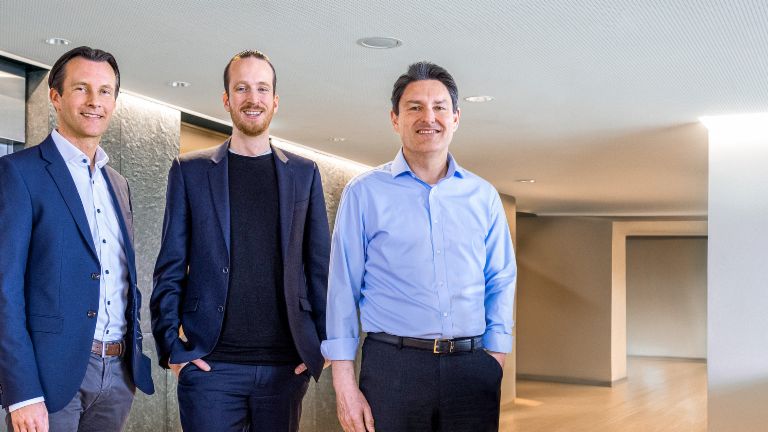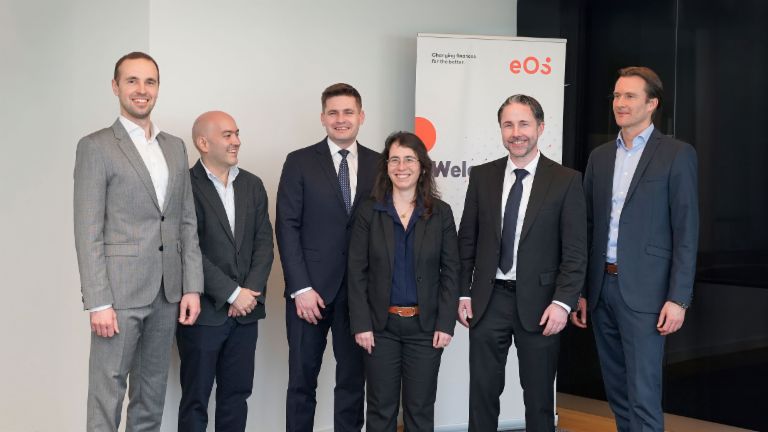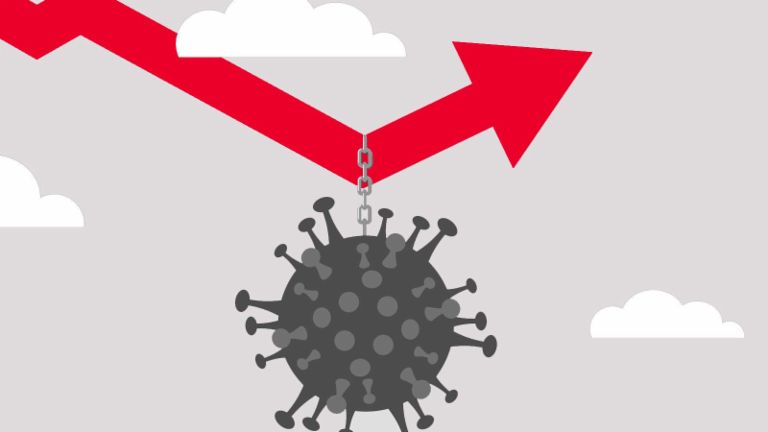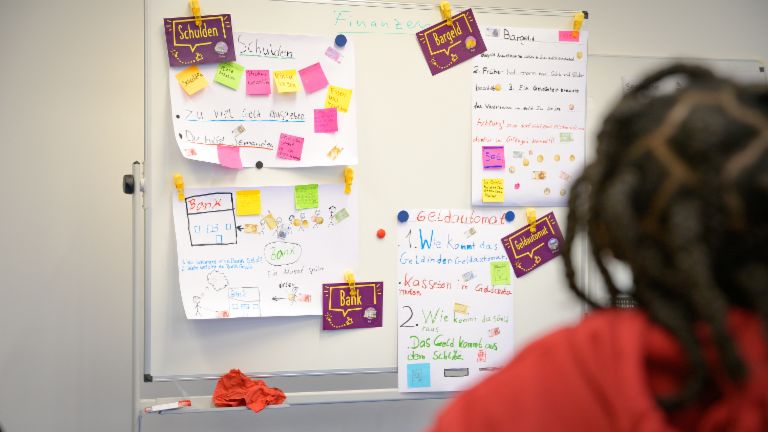
EOS Magazine
Annual and Sustainability Report 2024/25
In our Annual and Sustainability Report, we reflect on a successful financial year in which we courageously tackled new challenges. The report outlines the EOS Group’s principal activities and business highlights, along with its strategies for corporate, social, and environmental responsibility.
Press releases
EOS Group reports substantial increase in earnings in fiscal 2022/23
Press Release
Hamburg, Germany, July 26, 2023
- Significant increase in investment volume in Eastern and Western Europe
- Even stronger focus on international collaboration and digitalization
- Corporate Responsibility (CR): Combined Annual and Sustainability Report based on Global Reporting Initiative (GRI) standards for first time
The EOS Group enjoyed strong growth in the 2022/23 financial year. Europe’s leading investor in non-performing loans, debt and real estate portfolios, and expert in the processing of outstanding receivables, achieved an EBITDA of EUR 445.9 million in fiscal 2022/23. A major factor in this success was the significant increase in investment volume of EUR 668.6 million (in the previous year) to EUR 1.2 billion, with EOS investing in both secured and unsecured receivables.
Outstanding operating performance
The expert processing of existing NPL portfolios (non-performing loans) from previous years also contributed to the increase in earnings and revenue in fiscal 2022/23. Marwin Ramcke, CEO of the EOS Group, had this to say: “Given the international political and macroeconomic situation at the beginning of the financial year, this kind of growth was not foreseeable. That we were able to achieve such a result in these turbulent times is due in particular to the dedication of our around 6,000 employees.”
The broad positioning of the EOS Group with 24 national subsidiaries in Europe has also had a positive impact on the overall result, says Justus Hecking-Veltman, CFO of the EOS Group. “Our diversification gives us enormous stability as a group of companies. We are not dependent on individual markets. Our longstanding expertise as a purchaser of NPL portfolios, but also our patience in certain markets, have paid dividends in this financial year,” says Hecking-Veltman.
Eastern Europe builds on previous year with high investment level
With a share of 42 percent, Eastern Europe is the strongest performing region within the EOS Consolidated. Compared with the previous year, the Eastern European subsidiaries were even able to increase their revenue by around 50 percent. “With an investment volume of around EUR 400 million, we were also able to build on our high figures from the year before,” says Carsten Tidow, the member of the Board responsible for Eastern Europe. This is exemplified not just by the renewed high investments in Greece, Poland and Croatia, but also by a small country like Bosnia and Herzegovina, where the secured NPL portfolio business was heavily expanded.
Western Europe quadruples investment volume
At EUR 612 million, the EOS Consolidated managed to more than quadruple its investment volume in Western Europe. This is attributable above all to the markets in France and Spain, says Dr. Andreas Witzig, member of the Board with responsibility for Western Europe. In this conjunction, Portugal is also of particular note: “Although our company there was only founded in 2022, today more than 20 colleagues are active in the Portuguese NPL market and have been able to complete their first NPL purchases.” The implementation of Kollecto+, the Group’s own debt collection software, which is already in use in eight EOS countries and creates relevant synergies, also contributed to the company’s good start.
High competitive pressures in Germany
In the German market, the EOS Consolidated recorded a decline in revenue. The main reason for this was the intense competition, says Andreas Kropp, Managing Director EOS Germany. “The German NPL market is the most established of all NPL markets we operate in as a Group. There are a lot of competitors on the market that ensure a high price level for the debt portfolios. Being connected to our own debt collection system Kollecto+ is an important step for us, allowing us to become more efficient and improve our competitiveness,” Kropp continues.
“Debt collection means taking responsibility”
For the first time, the EOS Group has published a combined annual report and sustainability report. It is based on the standards of the Global Reporting Initiative (GRI) and shows how EOS supports the UN’s sustainability goals.
“We have always said that debt collection means taking responsibility, so corporate responsibility has therefore long since been a major issue for us,” stresses CEO Marwin Ramcke. “We strive to become a little better every day. In this context, the GRI standards help us to make transparent how sustainable our actions are and what we are achieving in this area.” According to Andreas Kropp, this is not just a matter of traditional environmental issues. The fair treatment of defaulting consumers also plays a major role. “We want to help them become debt-free as quickly as possible. To this end we offer various services that allow people to pay anonymously at any time. In our German service portal, consumers can also set their own installment rates.”
About the EOS Group
The EOS Group is a leading technology-driven investor in receivables portfolios and an expert in the processing of outstanding receivables. With around 50 years of experience and offices in 24 countries, EOS offers smart services for receivables management worldwide. Its key target sectors are banking, real estate, telecommunications, utilities, and e-commerce. EOS employs more than 6,000 people and is part of Otto Group.
For more information on the EOS Group, please go to: eos-solutions.com
Contact for press and media:
Maria Pancheva
phone: 0887953336
e-mail: [email protected]
EOS Group reports substantial increase in earnings in fiscal 2022/23
Press Release
Hamburg, Germany, July 26, 2023
- Significant increase in investment volume in Eastern and Western Europe
- Even stronger focus on international collaboration and digitalization
- Corporate Responsibility (CR): Combined Annual and Sustainability Report based on Global Reporting Initiative (GRI) standards for first time
The EOS Group enjoyed strong growth in the 2022/23 financial year. Europe’s leading investor in non-performing loans, debt and real estate portfolios, and expert in the processing of outstanding receivables, achieved an EBITDA of EUR 445.9 million in fiscal 2022/23. A major factor in this success was the significant increase in investment volume of EUR 668.6 million (in the previous year) to EUR 1.2 billion, with EOS investing in both secured and unsecured receivables.
Outstanding operating performance
The expert processing of existing NPL portfolios (non-performing loans) from previous years also contributed to the increase in earnings and revenue in fiscal 2022/23. Marwin Ramcke, CEO of the EOS Group, had this to say: “Given the international political and macroeconomic situation at the beginning of the financial year, this kind of growth was not foreseeable. That we were able to achieve such a result in these turbulent times is due in particular to the dedication of our around 6,000 employees.”
The broad positioning of the EOS Group with 24 national subsidiaries in Europe has also had a positive impact on the overall result, says Justus Hecking-Veltman, CFO of the EOS Group. “Our diversification gives us enormous stability as a group of companies. We are not dependent on individual markets. Our longstanding expertise as a purchaser of NPL portfolios, but also our patience in certain markets, have paid dividends in this financial year,” says Hecking-Veltman.
Eastern Europe builds on previous year with high investment level
With a share of 42 percent, Eastern Europe is the strongest performing region within the EOS Consolidated. Compared with the previous year, the Eastern European subsidiaries were even able to increase their revenue by around 50 percent. “With an investment volume of around EUR 400 million, we were also able to build on our high figures from the year before,” says Carsten Tidow, the member of the Board responsible for Eastern Europe. This is exemplified not just by the renewed high investments in Greece, Poland and Croatia, but also by a small country like Bosnia and Herzegovina, where the secured NPL portfolio business was heavily expanded.
Western Europe quadruples investment volume
At EUR 612 million, the EOS Consolidated managed to more than quadruple its investment volume in Western Europe. This is attributable above all to the markets in France and Spain, says Dr. Andreas Witzig, member of the Board with responsibility for Western Europe. In this conjunction, Portugal is also of particular note: “Although our company there was only founded in 2022, today more than 20 colleagues are active in the Portuguese NPL market and have been able to complete their first NPL purchases.” The implementation of Kollecto+, the Group’s own debt collection software, which is already in use in eight EOS countries and creates relevant synergies, also contributed to the company’s good start.
High competitive pressures in Germany
In the German market, the EOS Consolidated recorded a decline in revenue. The main reason for this was the intense competition, says Andreas Kropp, Managing Director EOS Germany. “The German NPL market is the most established of all NPL markets we operate in as a Group. There are a lot of competitors on the market that ensure a high price level for the debt portfolios. Being connected to our own debt collection system Kollecto+ is an important step for us, allowing us to become more efficient and improve our competitiveness,” Kropp continues.
“Debt collection means taking responsibility”
For the first time, the EOS Group has published a combined annual report and sustainability report. It is based on the standards of the Global Reporting Initiative (GRI) and shows how EOS supports the UN’s sustainability goals.
“We have always said that debt collection means taking responsibility, so corporate responsibility has therefore long since been a major issue for us,” stresses CEO Marwin Ramcke. “We strive to become a little better every day. In this context, the GRI standards help us to make transparent how sustainable our actions are and what we are achieving in this area.” According to Andreas Kropp, this is not just a matter of traditional environmental issues. The fair treatment of defaulting consumers also plays a major role. “We want to help them become debt-free as quickly as possible. To this end we offer various services that allow people to pay anonymously at any time. In our German service portal, consumers can also set their own installment rates.”
About the EOS Group
The EOS Group is a leading technology-driven investor in receivables portfolios and an expert in the processing of outstanding receivables. With around 50 years of experience and offices in 24 countries, EOS offers smart services for receivables management worldwide. Its key target sectors are banking, real estate, telecommunications, utilities, and e-commerce. EOS employs more than 6,000 people and is part of Otto Group.
For more information on the EOS Group, please go to: eos-solutions.com
Contact for press and media:
Maria Pancheva
phone: 0887953336
e-mail: [email protected]
EOS Group reports substantial increase in earnings in fiscal 2022/23
Press Release
Hamburg, Germany, July 26, 2023
- Significant increase in investment volume in Eastern and Western Europe
- Even stronger focus on international collaboration and digitalization
- Corporate Responsibility (CR): Combined Annual and Sustainability Report based on Global Reporting Initiative (GRI) standards for first time
The EOS Group enjoyed strong growth in the 2022/23 financial year. Europe’s leading investor in non-performing loans, debt and real estate portfolios, and expert in the processing of outstanding receivables, achieved an EBITDA of EUR 445.9 million in fiscal 2022/23. A major factor in this success was the significant increase in investment volume of EUR 668.6 million (in the previous year) to EUR 1.2 billion, with EOS investing in both secured and unsecured receivables.
Outstanding operating performance
The expert processing of existing NPL portfolios (non-performing loans) from previous years also contributed to the increase in earnings and revenue in fiscal 2022/23. Marwin Ramcke, CEO of the EOS Group, had this to say: “Given the international political and macroeconomic situation at the beginning of the financial year, this kind of growth was not foreseeable. That we were able to achieve such a result in these turbulent times is due in particular to the dedication of our around 6,000 employees.”
The broad positioning of the EOS Group with 24 national subsidiaries in Europe has also had a positive impact on the overall result, says Justus Hecking-Veltman, CFO of the EOS Group. “Our diversification gives us enormous stability as a group of companies. We are not dependent on individual markets. Our longstanding expertise as a purchaser of NPL portfolios, but also our patience in certain markets, have paid dividends in this financial year,” says Hecking-Veltman.
Eastern Europe builds on previous year with high investment level
With a share of 42 percent, Eastern Europe is the strongest performing region within the EOS Consolidated. Compared with the previous year, the Eastern European subsidiaries were even able to increase their revenue by around 50 percent. “With an investment volume of around EUR 400 million, we were also able to build on our high figures from the year before,” says Carsten Tidow, the member of the Board responsible for Eastern Europe. This is exemplified not just by the renewed high investments in Greece, Poland and Croatia, but also by a small country like Bosnia and Herzegovina, where the secured NPL portfolio business was heavily expanded.
Western Europe quadruples investment volume
At EUR 612 million, the EOS Consolidated managed to more than quadruple its investment volume in Western Europe. This is attributable above all to the markets in France and Spain, says Dr. Andreas Witzig, member of the Board with responsibility for Western Europe. In this conjunction, Portugal is also of particular note: “Although our company there was only founded in 2022, today more than 20 colleagues are active in the Portuguese NPL market and have been able to complete their first NPL purchases.” The implementation of Kollecto+, the Group’s own debt collection software, which is already in use in eight EOS countries and creates relevant synergies, also contributed to the company’s good start.
High competitive pressures in Germany
In the German market, the EOS Consolidated recorded a decline in revenue. The main reason for this was the intense competition, says Andreas Kropp, Managing Director EOS Germany. “The German NPL market is the most established of all NPL markets we operate in as a Group. There are a lot of competitors on the market that ensure a high price level for the debt portfolios. Being connected to our own debt collection system Kollecto+ is an important step for us, allowing us to become more efficient and improve our competitiveness,” Kropp continues.
“Debt collection means taking responsibility”
For the first time, the EOS Group has published a combined annual report and sustainability report. It is based on the standards of the Global Reporting Initiative (GRI) and shows how EOS supports the UN’s sustainability goals.
“We have always said that debt collection means taking responsibility, so corporate responsibility has therefore long since been a major issue for us,” stresses CEO Marwin Ramcke. “We strive to become a little better every day. In this context, the GRI standards help us to make transparent how sustainable our actions are and what we are achieving in this area.” According to Andreas Kropp, this is not just a matter of traditional environmental issues. The fair treatment of defaulting consumers also plays a major role. “We want to help them become debt-free as quickly as possible. To this end we offer various services that allow people to pay anonymously at any time. In our German service portal, consumers can also set their own installment rates.”
About the EOS Group
The EOS Group is a leading technology-driven investor in receivables portfolios and an expert in the processing of outstanding receivables. With around 50 years of experience and offices in 24 countries, EOS offers smart services for receivables management worldwide. Its key target sectors are banking, real estate, telecommunications, utilities, and e-commerce. EOS employs more than 6,000 people and is part of Otto Group.
For more information on the EOS Group, please go to: eos-solutions.com
Contact for press and media:
Maria Pancheva
phone: 0887953336
e-mail: [email protected]
Sofia, 16 March 2023
- Europeans watch their spending more closely, worried about inflationary processes
- Compared to the last 6 months, young people are more likely to pay in cash, despite the variety of payment methods
- Survey reports increased need for information on how young people can manage their finances properly
According to the latest consumer survey by international financial services provider EOS Group, for 53% of Europeans, rising inflation rates are leading to a closer eye on prices, with 44% saying they are increasingly taking advantage of promotional offers when shopping around. In this context, around three-quarters of respondents (73%) say they are worried about their finances, and young people (the 18 to 34 age group) are increasingly paying attention to how they plan their personal budget.
"In the survey we see that inflation is leaving its mark on consumer attitudes and this is quite normal, but it also has its positive side, as it leads to an increase in financial discipline in households," commented Raina Mitkova, Managing Director of EOS in Bulgaria. "The latest data from the European Commission is cautiously optimistic, as the year has started better than expected. We can see it in the collection levels in our business, which are normally an effective indicator of sensitive economic shocks - we are not seeing any problems with them at the moment."
Paying in cash makes managing costs easier for the young
In addition to a more responsible attitude towards personal finances, the survey also reveals changes in preferred payment methods. Although digital payments have become more popular during the pandemic, 42% of Europeans say they have used cash more often in the last six months. Interestingly, this trend also applies to the younger age group, with half of 18-34 year olds also using cash more often, alongside the traditionally wider range of payment methods typical of this age group. Over half of the younger age group stated a need to improve their financial literacy. This is well above average (43%) and exceeds the result for the over 50s generation (34%).
"The increased use of cash by young people is directly linked to their shared need to increase their financial literacy - they prefer to handle cash as it makes it easier for them to calculate their expenses," says Tihomir Valchev, Managing Director of EOS in Bulgaria.
"In school we do not learn how to manage our money, and this is just as important as subjects such as literature and mathematics and should be taught in primary school," adds Raina Mitkova, managing director of EOS in Bulgaria. "With their consumer behaviour, young people are making it clear that this problem needs to be addressed - this is one of EOS' missions that we are actively working towards."
Receivables management agencies - a personal approach to overcoming financial difficulties
As one of the leading international experts in receivables management, with branches in 25 countries, EOS works with reputable institutes to conduct market and consumer research every year. They research issues such as payment practices in individuals and businesses, payment methods, digitalization and help the company to most effectively assist its customers to find a tailored solution to reduce their debts.
"It's very important for us to be customer-centric, listen to customers and offer a personalised approach to repaying debts, with possible solutions including reaching mutual agreements on the amount of instalments and lump sum payments, as well as their preferences on when and how they would like to be contacted. This helps them personally, but it also helps the economy, where the money is returned," says Svetla Petrova, Commercial Director of EOS in Bulgaria.
About the EOS survey “Europeans in financial trouble? EOS Consumer Study”
In partnership with Dynata, a specialist in online surveys, EOS conducted an online poll of 7,700 consumers in 13 European countries between February 3–9, 2023. The survey focused on the question of how the last six months had affected the consumption patterns and financial situation of the participants.
About the EOS Group
EOS Group is one of the leading international providers of customised financial services and an investor in the buyout and receivables management industry. With more than 45 years of experience and companies in 25 countries, EOS offers its nearly 20,000 customers worldwide intelligent receivables management services. Mainly, the group companies partner with banks and companies in real estate, telecommunications, utilities and e-commerce. EOS has over 6,000 employees and is part of the Otto Group. More information about EOS Group can be found at: www.eos-solutions.com.
EOS Group has been present in Bulgaria since 2002 as EOS Matrix. Services offered include management and purchase of portfolios of overdue receivables (secured and unsecured) in the country and abroad, training and consulting in the field of debt collection, debt management software, legal advice. EOS Matrix is a co-founder of the Association for Debt Management in Bulgaria.
Contact for press and media:
Maria Pancheva,
Mobile: 0887953336
e-mail: [email protected]
- Bulgaria ranks second in Europe for business turnover recovered as a result of partnership with debt recovery specialists
- Record high levels of regular payments in Bulgaria and Europe
The positive trend this year reaches a kind of record for regularly paid invoices (81% on average for Europe). These are the findings of the representative survey conducted by EOS "Payment Habits in Europe" 2019, conducted for the 12th consecutive year in collaboration with the independent market research institute Kantar TNS, covering 3400 companies in 17 European countries.
Bulgaria follows this positive trend - 77% of issued invoices are paid on time (compared to an average of 79% for Eastern Europe and 76% for Bulgaria in 2018), 19% are paid with a delay (compared to 20% the previous year), and 4% are written off due to the inability to collect them at all (the indicator shows no change compared to 2018).
In line with the overall European picture in 2019, Bulgarian companies report their best payment performance in the last 6 years. Despite the improvement, Bulgarian businesses are still classified in the group with poor discipline - 23% of invoices issued to business partners are paid with a delay and/or not paid at all (compared to the European average of 19%). Other countries with a similar share of irregular payments are Greece (23%), Romania (22%), and the United Kingdom (21%).
Bulgarian citizens traditionally remain more disciplined compared to businesses - 18% of their invoices are overdue (compared to the Eastern European average of 16%), while businesses in Bulgaria delay payments or do not pay at all for 25% of issued invoices (compared to the Eastern European average of 21%). Although both indicators lag behind Central European levels, payment discipline among citizens visibly improves in 2019 - their delay decreases by 1 point compared to the previous year, while for businesses, it remains the same.
The days of delay among citizens also decrease (from 15 days to 14 days for 2019), while for businesses, the trend is reversed - business clients have to wait for their money 2 days longer (from 19 to 21 days for 2019).
Consequences of uncollected receivables
Delayed payments from customers affect the financial health of companies. The main negative consequences are: reduced profits (58%), lack of liquidity (48%), and higher interest expenses (47%). The trend persists that almost every fourth company in Bulgaria feels threatened by bankruptcy due to uncollected receivables - 24% (compared to 26% in 2018), with an average level for Eastern Europe of 16%.
To compensate for the negative effects of uncollected receivables, 27% of respondents limit investments, 25% reduce employees or do not hire new ones, and almost a quarter increase the prices of their goods and services.
Business attitudes
"Bulgarians traditionally remain more optimistic than the average for Europe regarding the future," comments Raina Mitkova, manager of EOS for Bulgaria.
"It is good to be more cautious against the backdrop of global economic perspectives - the situation between the USA and China, adjusted forecasts for Germany and Italy regarding expected growth, Brexit, etc. We are already witnessing a slowdown in the growth of the European economy, and the risks are interconnected and can lead to a decline in global trade and production."
In this context, Raina Mitkova adds: "Debt collection helps maintain trust in business and contributes to the stabilization of the economy. The effect of working with debt management companies is measured by improved business liquidity and an increase in the labor market. The funds collected by specialists are returned to the economy, as businesses use them to settle their own obligations (57%), create new jobs (51%), or for various types of investments - expanding market share (43%), research and development (27%), or financial market investments (23%)."
Payment methods and digitization
The digitization of business processes in Europe is expected to develop further. Only 49% of companies indicate that they have a high or very high level of implemented technologies. Regarding debt management processes, only 17% have achieved full automation.
Europeans remain traditionalists regarding payment methods, with the most popular being bank transfer, offered by 81% of companies. Next are direct debit (69%) and advance payment (50%). Only 28% of companies offer modern digital payment methods such as online transfers through external providers (23%), mobile payments (7%), and cryptocurrencies are rarely used as a means of payment (1%).
About the EOS Group's "Payment Habits in Europe" Study
The study was conducted in early 2019 and includes 3400 companies in seventeen European countries: Belgium, Bulgaria, the United Kingdom, Greece, Germany, Denmark, Spain, Poland, Romania, Russia, Slovakia, Slovenia, Hungary, France, Croatia, the Czech Republic, and Switzerland. The surveyed companies are divided according to their types of clients - citizens/end consumers (B2C) and business clients (B2B). The study has been conducted for the twelfth consecutive year on behalf of the EOS Group, in collaboration with the independent market research institute Kantar TNS (www.kantar.com).
About the EOS Group
The EOS Group is one of the leading international providers of individualized financial services. The group's main focus is on debt collection, debt purchasing, and business process outsourcing. With over 7,500 employees and more than 60 subsidiaries, EOS provides financial security to around 20,000 clients in over 26 countries through flexible solutions in the B2C and B2B segments. More information about the EOS Group can be found at: eos-solutions.com
In Bulgaria, the EOS Group has been present since 2002 and is currently represented by 2 subsidiaries - EOS Matrix Ltd. and EOS Services Ltd. The services offered include debt collection in Bulgaria and abroad, debt purchasing, training and consulting in the field of debt collection, debt management software, and legal consultations. EOS Matrix is a co-founder of the Association of Collection Agencies in Bulgaria.
The debt collection companies encourage good payment habits in society.
Payment habits are improving consistently in Europe and Bulgaria. This is indicated by the data from the representative survey on "Payment Habits in Europe" conducted by EOS in 2018, for the 11th consecutive year, in collaboration with the independent market research institute Kantar TNS. The survey covers 3,400 companies in 17 European countries.
In Bulgaria, the trend is similar - 76% of issued invoices are paid within the agreed-upon period (compared to an average of 78% for Eastern Europe and 74% for Bulgaria in 2017), 20% are paid with a delay (compared to 22% the previous year), and 4% are written off due to the impossibility of collection (the indicator shows no change compared to 2017).
In line with the overall European trend of improving payment habits, Bulgarian companies reported their best payment performance in the last 5 years in 2018. Despite the improvement, Bulgarian businesses still fall into the category of poor discipline - 25% of invoices issued to business partners are paid with a delay or not paid at all, compared to the European average of 22%. Other countries with a similar share of irregular payments are the United Kingdom (25%), Greece (27%), and Romania (27%), while Slovenia (30%) ranks at the bottom of the list. Citizens are more disciplined than businesses in this regard - an average of 19% of invoices are paid with a delay or remain unpaid (compared to 18% for Eastern Europe). A positive aspect for Bulgaria is that the study notes a delay in days below the European average (for both businesses and citizens) - Bulgarian businesses receive their payments with an average delay of 18 days after the due date, compared to 20 days delay for Europe.
Consequences of uncollected debts
Delayed payments from clients affect the financial health of companies: the main negative consequences are a decrease in profits (57%), higher interest expenses (47%), and lack of liquidity (47%). In 2018, the proportion of companies fearing extremely negative results increases - 26% of firms claim to feel threatened by bankruptcy due to overdue receivables, compared to the Eastern European average of 14%.
To compensate for the negative effects of uncollected debts, 27% of respondents limit investments, 25% of companies reduce staff or do not hire new employees, and almost a quarter increase the prices of their goods and services.
Significance of debt collection in Bulgaria
Companies find a solution to problems arising from delayed and written-off receivables by partnering with specialized debt management agencies - 44% of Bulgarian businesses use the services of external experts (an increase of 2 points compared to 2017).
The results are not delayed, and Bulgaria ranks first in Eastern Europe in terms of recovered revenues through collection companies - 11.1% of the companies' turnover has been recovered thanks to external debt management service providers. In this indicator, only Germany surpasses us in the whole of Europe.
"The effect of working with collection agencies is measured by improved business liquidity," comments Rayna Mitkova, Executive Director of EOS in Bulgaria. "These funds are returned to the economy, as companies use them to settle their own obligations (58%), create new jobs (48%), or for various types of investments - expanding market share (44%), research and development activities (33%), or financial market investments (26%)."
Business attitudes
European companies, as a whole, have a more positive outlook on the future than the previous year and remain cautiously optimistic about delayed payments. In all surveyed countries, the number of companies expecting a deterioration in payment habits in the future decreases (13% for 2018 compared to 19% for 2017). Bulgarian companies traditionally remain optimistic, with 32% of them expecting significant improvement in the next 2 years (compared to the Eastern European average of 27%). At the same time, 66% of respondents indicate that debt collection companies encourage good payment habits in society.
About the EOS Group's "Payment Habits in Europe" survey
The survey was conducted in early 2018 among 3,400 companies with an annual turnover of over 5 million euros in seventeen European countries: Belgium, Bulgaria, the United Kingdom, Greece, Germany, Denmark, Spain, Poland, Romania, Russia, Slovakia, Slovenia, Hungary, France, Croatia, the Czech Republic, and Switzerland. The surveyed companies were divided according to the type of their clients - citizens/end consumers (B2C) and business clients (B2B). The study has been conducted for the eleventh consecutive year on behalf of the EOS Group, in collaboration with the independent market research institute Kantar TNS (www.kantar.com).
About the EOS Group
The EOS Group is one of the leading international providers of individualized financial services. The main focus of the group is debt management in three main business areas: debt collection, debt purchasing, and business process outsourcing. With over 7,500 employees and more than 60 subsidiaries, EOS offers financial security to around 20,000 clients in over 26 countries through flexible solutions in the B2C and B2B segments. More information about the EOS Group can be found at: eos-solutions.com.
In Bulgaria, the EOS Group has been present since 2002 and is currently represented by 2 subsidiaries - EOS Matrix Ltd. and EOS Services Ltd. The offered services include debt collection in the country and abroad, debt purchasing, training and consultancy in the field of debt collection, debt management software, and legal consultations. EOS Matrix is a co-founder of the Association of Debt Collection Agencies in Bulgaria.
Media contact

EOS Matrix EAD
Dilyana Nedkova
Building 15, entrance A, floor 4, Business Park, Residential complex “Mladost” 4
1766 Sofia
Mobile: +359 899 992 303










































